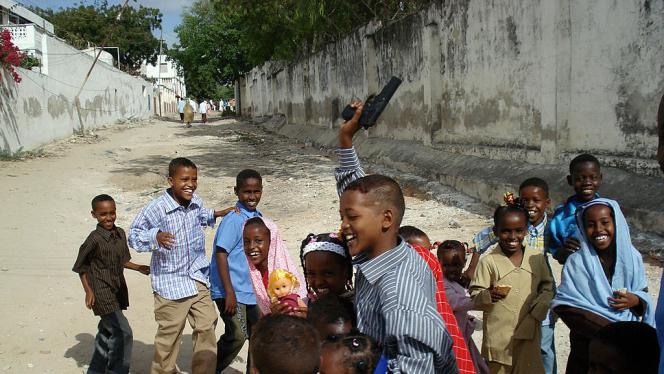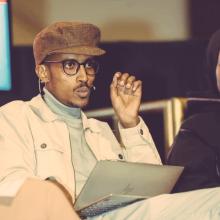Wednesday 16 October 2024
A child without childhood

Author, writer and translator, Abdiaziz Mahdi reflects on how war robs children of their childhoods.
“If children could, if adults knew.” ― Sigmund Freud
I often try to avoid delving into this part of my past. Childhood. It seems to be a common tendency among us all. We choose to gloss over certain memories while emphasising others. We may ignore one aspect while embracing another. We pick and choose and learn to impose a “narrative line upon the disparate images”, as Joan Didion put it, “to freeze the shifting phantasmagoria which is our actual experience”. In her book The White Album, she explained that this isn’t an incidental part of our experience as humans but is essential for our survival. “We tell ourselves stories in order to live,” she says.
This period is often considered the formative years of every individual. It is a time we are supposed to know like the back of our hand. Unfortunately, not all of us have the privilege of experiencing it fully. Some remain trapped in that time, while others evolve beyond it but lose those beautiful qualities of childhood which enrich our experience like curiosity, the ability to feel awe and our innocence. Some may even trespass into it, while others may not even recall being there at all. I believe I fall into the latter category.
It all began with a piercing cry, echoing from a block away from our home. I recognised the voice immediately – it belonged to my friends, just children like me. We were supposed to be playing together, but my mother had forbidden me from going out and having fun. So, they went ahead without me, and it was they who had victims of whatever caused that strange sound – the explosion of an unexploded object hidden beneath our favourite hangout spot. We had always wondered what lay beneath that piece of metal, likely from a military vehicle, but this was not how I had imagined we would discover it. It was in the heart of the city, in the middle of the day, right after lunchtime, and I was grounded, unable to witness the horror of my friends losing limbs and eyes.
The news of the tragedy, a defining moment of childhood in my neighbourhood, reached us through the grieving family. My own family was spared from the devastation, but I still mourned. I had been there; I knew the amputees and the blind. Yet, I could never fully comprehend the pain of losing a part of oneself while fully conscious. What I do know for certain is the feeling of almost missing out on the spectacle of tragedy and loss.
We used to celebrate Eid with guns. Not real ones, of course, but guns meticulously designed to remind us of our purpose: to familiarise ourselves with destruction and death. In Wash it Down, K’naan said our lives had become an “ode to the gun”. Everyone helped us reach that point. To be considered mature, one had to wield a rifle instead of a simple revolver. “There will be blood” was our motto, long before it became a film title.
We used to celebrate Eid with guns. Not real ones, of course, but guns meticulously designed to remind us of our purpose: to familiarise ourselves with destruction and death.
One day, as I tried to sneak out of the house, I heard an argument followed by gunshots from the empty space in front of our home. My mother, always omnipresent in my life, became my shield. I hid behind her, feeling as though she were a bulletproof wall or a bunker. We were trapped in the building, with me under her protection, for the entire day. The police arrived swiftly, spilling blood to prevent further bloodshed, as they are accustomed to doing. That paradox was never lost on me. I bore witness to the aftermath – the carnage, the exposed bone marrow – all before I even turned ten. It was chilling to see the mangled pieces of a person’s body; the pink flesh laid bare, the pool of blood, the contorted limbs. I often reflect on the fact that I encountered a dead body long before I ever laid eyes on a newborn. “Innocence, like freedom, is a privilege,” writes Jamaican novelist Nicole Dennis-Benn.
Before this incident, there was a man. A teacher. A religious figure with a long, unkempt beard and red, dry eyes. His shemagh, with its red and white zigzags, was typical of religious men of his standing. He was meant to be my mentor, my Islamic baptist, but his appearance was the first horror scene etched into my memory. He asked for my name. I gave him the correct one. “That, you said?” he asked, repeating a different name for confirmation. I couldn’t bring myself to say no and correct him. I just stood there, motionless. I was only five, not understanding why I was there or what I had to endure. He interpreted my silence as approval, as people often do, and enrolled me with the wrong name – a name that stayed with me forever. I sacrificed a piece of my identity to ensure my safety from this perceived danger in the shape of a man, a decision that still haunts me to this day.
I was born among the camels, as the great Somali scholar Said S. Samatar used to say and “camels do not keep records”. I belong to a generation caught in the tumultuous transition between two eras of national upheaval, the interval likened to a “heart attack” by K’naan. The exact date of my birth is a mystery, lost in the vast expanse of the desert where I was part of the camels’ world, roaming without keeping records. I was born in a harsh yet beautiful borderland, with only my mother and grandmother to guide me into existence.
I belong to a generation caught in the tumultuous transition between two eras of national upheaval, the interval likened to a “heart attack” by K’naan.
My mother, left to fend for herself in a place where there was no doctor or father, had to rely on my grandmother’s wisdom and the kindness of a maternal uncle to raise me. The arid plateau where I took my first breaths was devoid of rain and tenderness – a harsh and indifferent environment that mirrored the turmoil brewing in my parents’ country.
As I grew older, I came to realise that I was born during the early days of a civil war that ravaged the cities of my homeland – the second phase of the prolonged Somali conflict, following the collapse of the state. This war formed the backdrop to the drama of my childhood, where death and terror became the dominant themes which framed the contours of my life’s earliest chapter.
My life has been a series of fragmented moments, much like this piece of writing. It mirrors the disjointed nature of my existence – a wildling struggling to find its place in a world rife with uncertainty and loss. The tragic accident that claimed my cherished companions, and deprived them of vital organs, was a cruel misfortune – much like our lives and childhoods.
To put this into perspective, the explosive remnants that maimed my childhood friends are the same ones that later claimed the life of my beloved uncle, the only male presence at my birth – all of this occurring in my birthplace three decades apart. A different day, but the same unresolved tragedy.










